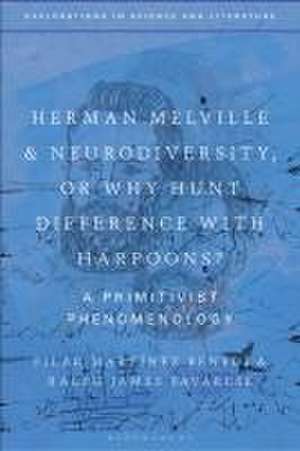Herman Melville and Neurodiversity, or Why Hunt Difference with Harpoons?: A Primitivist Phenomenology: Explorations in Science and Literature
Autor Pilar Martinez Benedi, Ralph James Savareseen Limba Engleză Hardback – 18 sep 2024
Preț: 509.52 lei
Preț vechi: 730.68 lei
-30% Nou
Puncte Express: 764
Preț estimativ în valută:
97.49€ • 101.79$ • 80.69£
97.49€ • 101.79$ • 80.69£
Carte disponibilă
Livrare economică 15-29 martie
Preluare comenzi: 021 569.72.76
Specificații
ISBN-13: 9781350360860
ISBN-10: 1350360864
Pagini: 224
Dimensiuni: 156 x 234 mm
Greutate: 0.45 kg
Editura: Bloomsbury Publishing
Colecția Bloomsbury Academic
Seria Explorations in Science and Literature
Locul publicării:London, United Kingdom
ISBN-10: 1350360864
Pagini: 224
Dimensiuni: 156 x 234 mm
Greutate: 0.45 kg
Editura: Bloomsbury Publishing
Colecția Bloomsbury Academic
Seria Explorations in Science and Literature
Locul publicării:London, United Kingdom
Caracteristici
Demonstrates one of the ways in which the humanities may contribute to neuroscientific investigation.
Notă biografică
Pilar Martinez Benedi is Assistant Professor of American Literature at the University of L'Aquila, Italy.Ralph James Savarese is Professor of English at Grinnell College, USA.
Cuprins
Introduction: Far Borders Chapter 1. Hard of Meaning Chapter 2. Phantom Empathy: Ahab, Race, and Mirror-Touch Synesthesia Chapter 3. "First Principles": Animism in Pierre Chapter 4. Billy Fo(u)wl: Stuttering and the Perverse Triumph of the Perceptual Afterword: I and My Neurological Difference Acknowledgments Index Bibliography
Recenzii
In this provocative study, Pilar Martinez-Benedí and Ralph James Savarese reveal the great anticipator Herman Melville's illumination of the hidden life of the sensory and the neural unconscious. In a work more dialogic than diagnostic, Martinez-Benedí and Savarese explore Melville's advocacy for the perceptual and his ardent overcoming of biased categories and limiting social constructs. They cast wildchild and cosmopolitan Melville as the bard of neuroatypicality.









